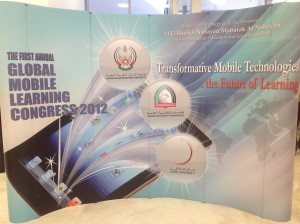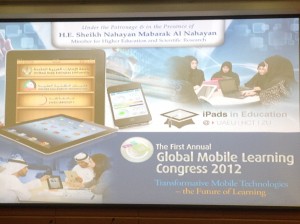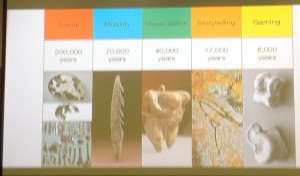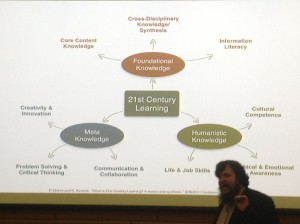Background
In September 2012, three Federal higher education institutions in the U.A.E began educating Foundation Programme students by increasing the amount of mobile learning they engage in. Hence, all participants are given iPads which are now the main vehicle for delivering and interacting with course content and fellow learners and teachers. This m-learning revolution springs from the vision of empowering students with the learning capabilities and skills to be successful in global and commercial environments, and from research such as that outlined in the NWC Horizon Report, 2012, showing that e-learning and m-learning lead to deeper, broader learning as students are more engaged in the acquisition of knowledge.
Present Considerations
H.E. Sheikh Nahayan Mabarak Al Nahayan, Minister of Higher Education and Scientific Research in the U.A.E, spoke of the connectivity, accessibility, and creativity that m-learning affords anywhere, anytime. He also stressed the need for collaboration between educational providers, technology providers and leaders in order to bring about meaningful change.
John Couch, Vice President, Worldwide Apple Education, said that it was the vision of Apple to recognize the unique value that every child makes, and their mission to help each child learn and love learning through targeted mobile pedagogy. Dr James Ashby, President and Chief of Psychometrics, CORE Edutech and Mabs Khan, Regional Director of British Telecom, envision analytics and software feedback loops facilitating student tracking, thus increasing possibilities of learner specific targeted pedagogy. For example, dashboard will notify teachers and learners of an individual’s progress and how they rate against their own performance at earlier periods in their educational journey.
All speakers talked of the need to think beyond present day pedagogy and forms of assessment, so that e-learning devices actually transform and redefine education, rather than merely being a substitute for past innovations such as the blackboard or overhead projector. Dr. Reuben Puentedura, Founder and President of Hippasus, presented the SAMR model of change and innovative implementation.
Dr. Puentedura provided examples of how a history lesson on the Industrial Revolution, could lead to changes in the learning paradigm, giving digital mind mapping as an example of the modification stage and iBook based student generated lesson material through which future learners could be educated, as an example of the redefinition stage. I personally think this needs to be thought about more in terms of EFL, as such activities would remain at the substitution stage in many EFL classroom because these tasks have been carried out by second language learners for decades, and would be merely replacing a pen and paper version with a digital version. The collaborative, communicative nature of language learning has meant that teacher fronted classrooms have not been advocated for decades. However, the direction of EFL iPadagogy and m-learning methodology is a key unanswered question at present.
The TPCK (Technology, Content and Pedagogy) Model devised by Koehler and Mishra, requires the additional element of language placed in central position, for second language programmes: language as content focus and language as meta-communicative classroom language.
Dr Puentedura suggested a selection framework to help ensure that tools, activities and workflow plans are based on proven educational principles, thus meeting learner needs. The five areas to consider are social, mobility, visualization, storytelling and gaming.
Activities and materials should comprise these qualities and help develop within the learner the 21st century skills or competencies, such as Meta Knowledge for example, creativity and innovation; Humanistic Knowledge such as critical and emotional awareness and Foundation Knowledge which includes information literacy. Therefore, the challenge of educators, technology experts and leaders is to identify the skill sets required by the future; break them down into achievable learner outcomes and harness new ways of engaging with content and interacting with fellow learners such as webinars, simultaneously co-authored documents etc. The latter is already being revolutionized by digital sharing and publishing platforms, which are leading to the creation of new finished products such as interactive iBooks which motivate students in that they are viewed by a wide, public discourse community and which have a professional, polished appearance.
The danger is that innovations in pedagogy will precede innovations in assessment and that the negative wash back of this will be the curtailing and slowing down of developments in education. The fear is that the need for gate keeping exams, international benchmarking and exam security will keep assessment at the substitution, rather than the redefinition level. In other words as Dr Peter Scott asked ‘How can we progress from a ‘prove it’ to a ‘ move’ it assessment mindset?’
Guiding Questions
The m-learning initiative in the U.A.E is in its infancy and there are more questions than answers at this early stage of exploration. Questions to be considered are:
- What are 21st century learning processes?
- What learning outcomes and competences are most generative?
- Which traditional concepts of teaching and learning will change?
- To what extent can students be the co-authors of their own learning?
- What online skills have learners already developed in their lives outside the classroom?
- What are the new educational and technological methods and concepts that will foster learning both inside and outside the classroom?
- How can educators increase their own efficacy so that they inspire learners and educational environments run smoothly?
- What forms of technological innovation are necessary to break down classroom walls?
- What forms of assessment test 21st century learner competences?
- How will we know that m learning is transforming education?
- How will we know that the UAE m learning initiative is achieving what it is intended to?







